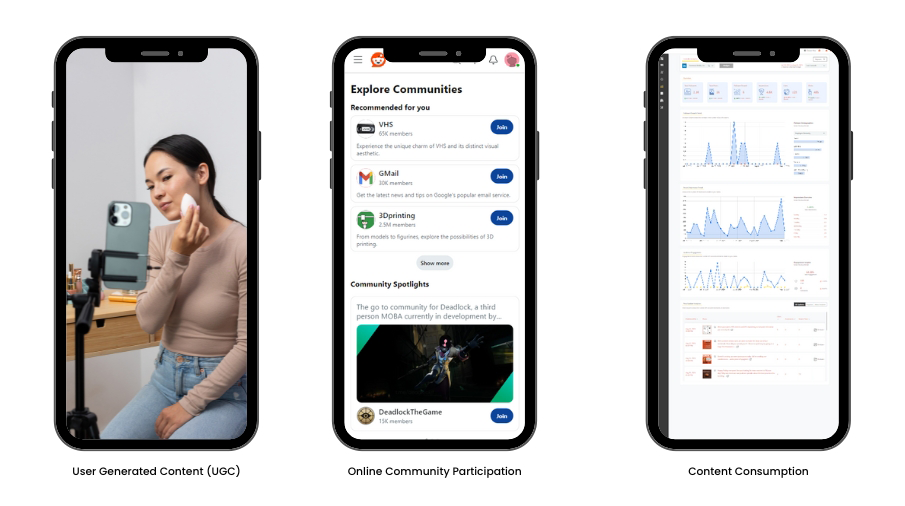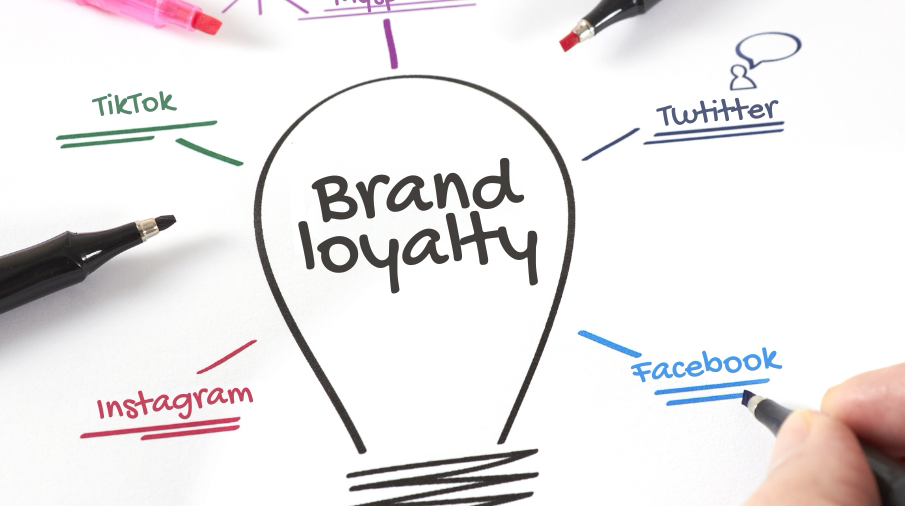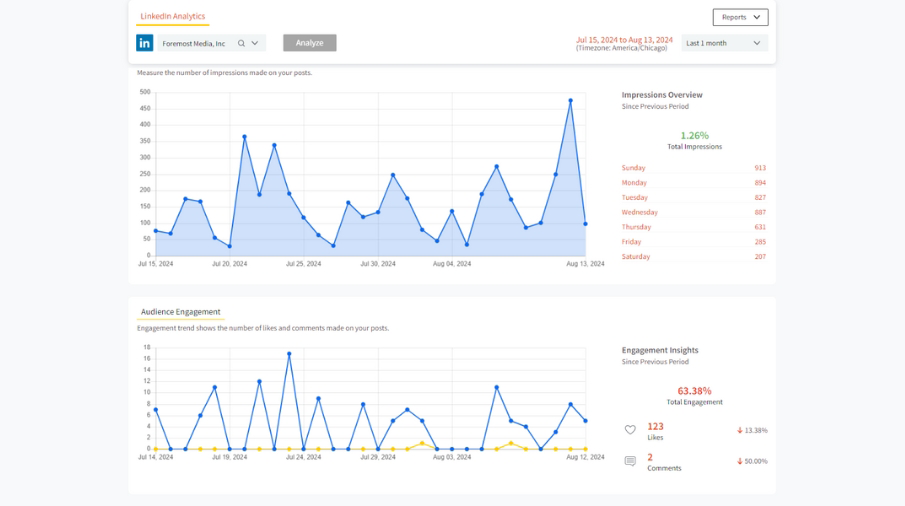By now, we’re all aware that social media has transcended its original purpose as a platform for social interaction, evolving into a powerful tool that influences how consumers behave and perceive brands. More and more businesses are realizing the importance of leveraging social media to craft strong customer relationships as they navigate the complex modern marketplace.
With billions of people using all kinds of social media platforms, businesses have unprecedented abilities to interact with consumers in real time. This digital landscape has fundamentally changed how businesses and customers engage, presenting opportunities to foster personalized experiences and collaborative brand communities.
Exploring the relationship between social media and customer loyalty reveals a shift in marketing where traditional approaches are consistently being redefined. In today's interconnected world, understanding how social media impacts customer loyalty is not just advantageous – it's crucial for companies looking to succeed in the competitive global market.

Understanding Customer Loyalty in the Digital Era
Customer loyalty is the backbone of sustainable business growth and profitability. Loyal customers not only make repeat purchases, but also become brand advocates, promoting the business through word-of-mouth, reviews and, increasingly, through social media channels.
The more engaged a consumer is, the more likely they are to stay loyal to the brand. While traditional indicators like purchase frequency and customer lifetime value remain relevant, businesses must now consider a spectrum of digital engagement markers:
- Social media interaction: Likes, shares, comments, and follows across various platforms.
- User-generated content: Customer-created posts, reviews, or videos featuring the brand.
- Online community participation: Active involvement in brand-related forums or discussion groups.
- Content consumption: Time spent engaging with brand-produced digital content, such as blogs, videos, or podcasts.
- Digital brand advocacy: Spontaneous promotion of the brand in online spaces.
- Personalized engagement: Response to tailored digital marketing efforts, such as email campaigns or targeted ads.
As we delve deeper into the influence of social media marketing activities on customer loyalty, it becomes clear that the digital era has not only changed how loyalty is expressed, but has also created new opportunities for brands to strengthen customer relationships in ways that were previously unimaginable

The Role of Social Media in Building Loyalty
Social media platforms like Facebook, Instagram, TikTok, X (Formerly known as Twitter), Reddit, and LinkedIn offer businesses a unique opportunity to connect with their customers on a more personal level. Unlike traditional advertising, social media allows for two-way communication, enabling brands and consumers to interact directly.
Key features of Social Media in Building Customer Loyalty:
- Enhanced Customer Engagement: Through comments, likes, shares, and direct messages, customers have the ability to interact with brands on a more personal level, creating a stronger emotional connection and a parasocial relationship. This engagement encourages a sense of belonging, making customers feel valued and more likely to remain loyal to the brand.
- Personalized Customer Experience: Social media platforms offer powerful data analytics tools that allow businesses to track customer behavior and preferences. This data can be used to create personalized marketing campaigns that resonate with individual customers, further strengthening their loyalty. For instance, targeted ads on social media that reflect a customer’s browsing history or past purchases can make them feel understood and appreciated.
- Community Building: Brands that successfully build online communities on social media platforms create a sense of belonging among their customers. These communities often become self-sustaining, with loyal customers advocating for the brand, sharing their experiences, and encouraging others to join. This peer influence is a powerful driver of customer loyalty.
- Transparency and Trust: Social media allows brands to be transparent with their customers, which is essential for building trust. Regular updates, honest communication, and responsiveness to customer feedback demonstrate that the brand values its customers and is committed to maintaining a positive relationship with them. Trust is a critical component of loyalty, and social media provides the perfect platform for fostering it.
Effective social media strategies can transform casual customers into brand advocates, amplifying positive experiences and expanding organic reach. Through consistent, authentic, and value-driven content, companies can reinforce their brand identity, build trust, and stay top-of-mind with their audience.

Strategies for Leveraging Social Media to Boost Customer Loyalty
To successfully use social media as a tool for enhancing customer loyalty, businesses need to adopt a strategic approach that goes beyond mere presence on popular platforms. The following strategies can help companies harness the full potential of social media in crafting long-lasting customer relationships.
Key strategies:
- Consistent Engagement: Regularly post content that is not only promotional but also informative, entertaining, and engaging. Use user-generated content, follow trends, promote give-aways, and make interactive content to keep your audience engaged.
- Reward Loyalty: Implement loyalty programs that reward customers for their engagement on social media. This could include exclusive discounts, early access to new products, or special recognition or rewards for brand advocates.
- Respond to Feedback: Actively listen to what your customers are saying on social media and respond promptly. Whether the feedback is positive or negative, acknowledging it shows that you care about your customers' opinions.
- Leverage User-Generated Content: Encourage your customers to create and share content related to your brand. This not only increases engagement but also serves as authentic testimonials, which are more trusted by other consumers.
- Collaborate with Influencers: Partnering with influencers who align with your brand can help you reach a broader audience and build credibility. Influencers have loyal followers who trust their recommendations, making them powerful allies in building customer loyalty.
By implementing these strategies, businesses can create a vibrant social media presence that not only attracts customers, but also converts them into loyal brand followers. The key lies in viewing social media as not just a marketing tool, but as a platform for building genuine, long-lasting relationships with customers. This approach requires dedication, creativity, and a willingness to adapt to the ever-changing social media landscape, but the rewards in terms of customer loyalty and brand strength can be substantial.

Measuring the Impact of Social Media on Customer Loyalty
In the dynamic world of digital marketing, the ability to quantify the impact of social media efforts on customer loyalty is vital for refining strategies and maximizing return on investment. To ensure that social media initiatives are effectively contributing to customer loyalty, it's imperative to establish a clear framework for measurement and analysis.
Key ways to measure the impact of social media on customer loyalty:
- Engagement Rates: Monitor likes, shares, comments, and mentions to gauge how actively your audience is interacting with your content.
- Customer Retention Rates: Track the percentage of customers who continue to engage with your brand over time.
- Net Promoter Score (NPS): Use surveys to measure the likelihood of customers recommending your brand to others.
- Conversion Rates: Analyze how social media interactions lead to actual sales or desired actions on your website.
By regularly tracking these metrics, you can refine your social media strategy to better meet your customers’ needs and enhance their loyalty.
Social media marketing activities have a profound influence on customer loyalty. By fostering engagement, personalizing experiences, building communities, and maintaining transparency, businesses can cultivate a loyal customer base that not only returns to your brand, but also advocates for it. As digital marketing continues to evolve, leveraging the power of social media will be key to sustaining and growing customer loyalty.
At Foremost Media, we leverage two decades of experience in web design and digital marketing. Contact us today to learn more about how to harness the power of social media and elevate customer loyalty!
